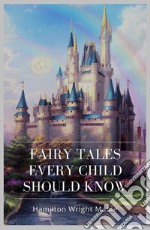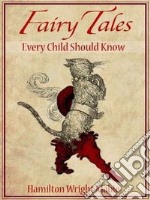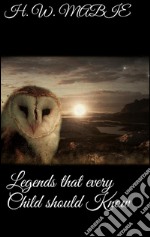Hamilton eBooks
eBooks di Hamilton di Formato Mobipocket
Fairy Tales Every Child Should Know. E-book. Formato Mobipocket Hamilton Wright Mabie - Qasim Idrees, 2018 -
Classics included in this volume include: One Eye, Two Eyes, Three Eyes, The Magic Mirror, The Enchanted Stag, Hansel and Grethel, The Story of Aladdin, This Story of Ali Baba, The Second Voyage of Sinbad the Sailor, The White Cat, The Golden Goose, The Twelve Brothers, The Fair One With the Golden Locks, Tom Thumb, Blue Beard, Cinderella, Puss In Boots, The Sleeping Beauty In the Wood, Jack and The Bean-Stalk
Fairy Tales Every Child Should Know. E-book. Formato Mobipocket Hamilton Wright Mabie - Qasim Idrees, 2017 -
Classics included in this volume include: One Eye, Two Eyes, Three Eyes, The Magic Mirror, The Enchanted Stag, Hansel and Grethel, The Story of Aladdin, This Story of Ali Baba, The Second Voyage of Sinbad the Sailor, The White Cat, The Golden Goose, The Twelve Brothers, The Fair One With the Golden Locks, Tom Thumb, Blue Beard, Cinderella, Puss In Boots, The Sleeping Beauty In the Wood, Jack and The Bean-Stalk
Legends that every child should know. E-book. Formato Mobipocket Hamilton Wright Mabie - Hamilton Wright Mabie, 2015 -
If we knew how the words in our language were made and what they have meant to successive generations of the men and women who have used them, we should have a new and very interesting kind of history to read. For words, like all other creations of man, were not deliberately manufactured to meet a need, as are the various parts of a bicycle or of an automobile; but grew gradually and slowly out of experiences which compelled their production. For it is one of the evidences of the brotherhood of men that, either by the pressure of necessity or of the instinct to describe to others what has happened to ourself and so make common property of personal experience, no interesting or influential or significant thing can befall a man that is not accompanied by a desire to communicate it to others. The word legend has a very interesting history, which sheds light not only on its origin but on early habits of thought and customs. It is derived from the Latin verb legere, which means 'to read.' As legends are often passed down by word of mouth and are not reduced to writing until they have been known for centuries by great numbers of people, it seems difficult at first glance to see any connection between the Latin word and its English descendant. In Russia and other countries, where large populations live remote from cities and are practically without books and newspapers, countless stories are told by peasant mothers to their children, by reciters or semi-professional story-tellers, which have since been put into print. For a good many hundred years, probably, the vast majority of legends were not read; they were heard.


